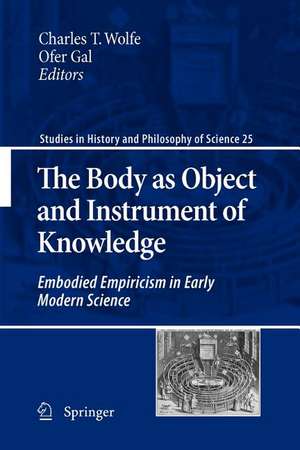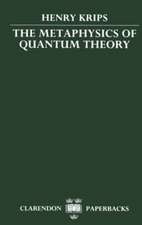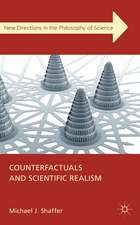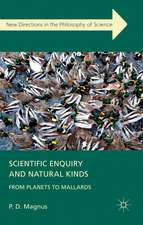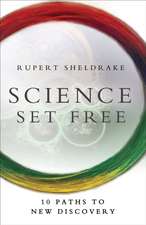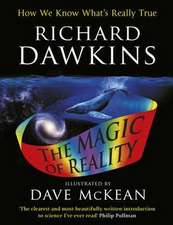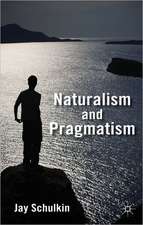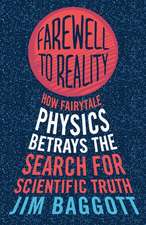The Body as Object and Instrument of Knowledge: Embodied Empiricism in Early Modern Science: Studies in History and Philosophy of Science, cartea 25
Editat de Charles T. Wolfe, Ofer Galen Limba Engleză Paperback – 28 mai 2012
This volume focuses on the development of empiricism as an interest in the body – as both the object of research and the subject of experience. Re-embodying empiricism shifts the focus of interest to the ‘life sciences’; medicine, physiology, natural history. In fact, manyof the active members of the Royal Society were physicians, and a significant number of those, disciples of William Harvey and through him, inheritors of the empirical anatomy practices developed in Padua during the 16th century. Indeed, the primary research interests of the early Royal Society were concentrated on the body, human and animal, and its functions much more than on mechanics. Similarly, the Académie des Sciences directly contradicted its self-imposed mandate to investigate Nature in mechanistic fashion, devoting a significant portion of its Mémoires to questions concerning life, reproduction and monsters, consulting empirical botanists, apothecaries and chemists, and keeping closer to experience than to the Cartesian standards of well-founded knowledge.
These highlighted empirical studies of the body, were central in a workshop in the beginning of 2009 organized by the unit for History and Philosophy of Science in Sydney. The papers that were presented bysome of the leading figures in this area are presented in this volume.
| Toate formatele și edițiile | Preț | Express |
|---|---|---|
| Paperback (1) | 1219.77 lei 6-8 săpt. | |
| SPRINGER NETHERLANDS – 28 mai 2012 | 1219.77 lei 6-8 săpt. | |
| Hardback (1) | 1225.94 lei 6-8 săpt. | |
| SPRINGER NETHERLANDS – 27 apr 2010 | 1225.94 lei 6-8 săpt. |
Din seria Studies in History and Philosophy of Science
- 15%
 Preț: 650.19 lei
Preț: 650.19 lei - 15%
 Preț: 700.75 lei
Preț: 700.75 lei -
 Preț: 284.47 lei
Preț: 284.47 lei - 15%
 Preț: 702.24 lei
Preț: 702.24 lei -
 Preț: 389.88 lei
Preț: 389.88 lei - 18%
 Preț: 1222.94 lei
Preț: 1222.94 lei - 15%
 Preț: 647.08 lei
Preț: 647.08 lei - 15%
 Preț: 645.47 lei
Preț: 645.47 lei - 18%
 Preț: 956.33 lei
Preț: 956.33 lei - 18%
 Preț: 953.97 lei
Preț: 953.97 lei - 15%
 Preț: 646.11 lei
Preț: 646.11 lei - 15%
 Preț: 641.85 lei
Preț: 641.85 lei - 15%
 Preț: 644.49 lei
Preț: 644.49 lei - 18%
 Preț: 951.29 lei
Preț: 951.29 lei - 15%
 Preț: 647.40 lei
Preț: 647.40 lei - 18%
 Preț: 953.20 lei
Preț: 953.20 lei - 18%
 Preț: 946.87 lei
Preț: 946.87 lei - 18%
 Preț: 1384.56 lei
Preț: 1384.56 lei - 18%
 Preț: 1234.14 lei
Preț: 1234.14 lei - 15%
 Preț: 637.78 lei
Preț: 637.78 lei - 15%
 Preț: 633.53 lei
Preț: 633.53 lei - 24%
 Preț: 586.94 lei
Preț: 586.94 lei - 18%
 Preț: 967.56 lei
Preț: 967.56 lei - 15%
 Preț: 641.38 lei
Preț: 641.38 lei - 15%
 Preț: 642.68 lei
Preț: 642.68 lei - 15%
 Preț: 642.03 lei
Preț: 642.03 lei - 15%
 Preț: 641.85 lei
Preț: 641.85 lei
Preț: 1219.77 lei
Preț vechi: 1487.54 lei
-18% Nou
Puncte Express: 1830
Preț estimativ în valută:
233.40€ • 244.34$ • 193.13£
233.40€ • 244.34$ • 193.13£
Carte tipărită la comandă
Livrare economică 05-19 aprilie
Preluare comenzi: 021 569.72.76
Specificații
ISBN-13: 9789400732018
ISBN-10: 9400732015
Pagini: 360
Ilustrații: X, 350 p.
Dimensiuni: 155 x 235 x 19 mm
Greutate: 0.5 kg
Ediția:2010
Editura: SPRINGER NETHERLANDS
Colecția Springer
Seria Studies in History and Philosophy of Science
Locul publicării:Dordrecht, Netherlands
ISBN-10: 9400732015
Pagini: 360
Ilustrații: X, 350 p.
Dimensiuni: 155 x 235 x 19 mm
Greutate: 0.5 kg
Ediția:2010
Editura: SPRINGER NETHERLANDS
Colecția Springer
Seria Studies in History and Philosophy of Science
Locul publicării:Dordrecht, Netherlands
Public țintă
ResearchCuprins
Embodied Empiricism.- The Body as Object.- Victories for Empiricism, Failures for Theory: Medicine and Science in the Seventeenth Century.- Practical Experience in Anatomy.- Early Modern Empiricism and the Discourse of the Senses.- Alkahest and Fire: Debating Matter, Chymistry, and Natural History at the Early Parisian Academy of Sciences.- John Locke and Helmontian Medicine.- The Body as Instrument.- Empiricism Without the Senses: How the Instrument Replaced the Eye.- Mastering the Appetites of Matter. Francis Bacon’s Sylva Sylvarum.- ‘A Corporall Philosophy’: Language and ‘Body-Making’ in the Work of John Bulwer (1606–1656).- Memory and Empirical Information: Samuel Hartlib, John Beale and Robert Boyle.- Lamarck on Feelings: From Worms to Humans.- Embodied Minds.- Carelessness and Inattention: Mind-Wandering and the Physiology of Fantasy from Locke to Hume.- Instrumental or Immersed Experience: Pleasure, Pain and Object Perception in Locke.- Empiricism and Its Roots in the Ancient Medical Tradition.- Embodied Stimuli: Bonnet’s Statue of a Sensitive Agent.- Empiricist Heresies in Early Modern Medical Thought.
Recenzii
“The book’s fifteen chapters offer fresh perspectives on Baconian science in which the body features a starring role, as both research object and medium of experience. … The Body as Object and Instrument of Knowledge represents an important interdisciplinary contribution to the history and philosophy of science. It will primarily appeal to historians and philosophers of the early modern life sciences with an interest in instruments, technology, and the cultural contexts of the body.” (Margaret Carlyle, Annals of Science, Vol. 74 (4), October, 2017)
“The Body as Object and Instrument of Knowledge challenges traditional accounts of empiricism in the early modern period ... . for specialist audiences in the history of science ... . focus of the volume on the role of the body in the dialectic between subjective versus objective knowledge will provide welcome encouragement for further scholarly research ... . overall message of the importance of the embodied, lived experience for early modern debates about science is a welcome contribution to our field.” (Ian Stewart, Isis, Vol. 103, No. 3, September, 2012)
“This collective volume … questions the role of the body ‘as both an object of research and an instrument of experience’ in the transformations of the life sciences from the late Renaissance to the early nineteenth century … . this volume, by opening many ways for exploring the transforming status of the body and its relationship with the rise of empiricism from the late Renaissance, is a very valuable tool for every scholar interested in … the history of the early modern science.” (Stéphane Schmitt, Early Science and Medicine, Vol. 16, 2011)
“What the reader will extract from the text overall is an insightful and informative spectrum of medical and scientific practices (and to some extent their philosophical implications) throughout much of the early modern period. Wolfe and Gal have done a good job of bringing together a wide range of contributions emerging from various disciplines, resulting in a wonderful analysis of the practice – rather than the theory – of empiricism in early modern science.” (Jordan Taylor, British Journal for the History of Philosophy, Vol. 19, No. 6, 2011)
“Three different major dimensions of the study of the body and the emergence of empiricism this is a collection, then, which makes us think anew about the origins of the methods and mentality of the scientific movement in its formative centuries. … this collection places the human body back squarely in our mapping of the development of early modern science.”(John Gascoigne, Metascience, October, 2010)
“The Body as Object and Instrument of Knowledge challenges traditional accounts of empiricism in the early modern period ... . for specialist audiences in the history of science ... . focus of the volume on the role of the body in the dialectic between subjective versus objective knowledge will provide welcome encouragement for further scholarly research ... . overall message of the importance of the embodied, lived experience for early modern debates about science is a welcome contribution to our field.” (Ian Stewart, Isis, Vol. 103, No. 3, September, 2012)
“This collective volume … questions the role of the body ‘as both an object of research and an instrument of experience’ in the transformations of the life sciences from the late Renaissance to the early nineteenth century … . this volume, by opening many ways for exploring the transforming status of the body and its relationship with the rise of empiricism from the late Renaissance, is a very valuable tool for every scholar interested in … the history of the early modern science.” (Stéphane Schmitt, Early Science and Medicine, Vol. 16, 2011)
“What the reader will extract from the text overall is an insightful and informative spectrum of medical and scientific practices (and to some extent their philosophical implications) throughout much of the early modern period. Wolfe and Gal have done a good job of bringing together a wide range of contributions emerging from various disciplines, resulting in a wonderful analysis of the practice – rather than the theory – of empiricism in early modern science.” (Jordan Taylor, British Journal for the History of Philosophy, Vol. 19, No. 6, 2011)
“Three different major dimensions of the study of the body and the emergence of empiricism this is a collection, then, which makes us think anew about the origins of the methods and mentality of the scientific movement in its formative centuries. … this collection places the human body back squarely in our mapping of the development of early modern science.”(John Gascoigne, Metascience, October, 2010)
Textul de pe ultima copertă
It was in 1660s England, according to the received view, in the Royal Society of London, that science acquired the form of empirical enquiry we recognize as our own: an open, collaborative experimental practice, mediated by specially-designed instruments, supported by civil discourse, stressing accuracy and replicability. Guided by the philosophy of Francis Bacon, by Protestant ideas of thisworldly benevolence, by gentlemanly codes of decorum and by a dominant interest in mechanics and the mechanical structure of the universe, the members of the Royal Society created a novel experimental practice that superseded former modes of empirical inquiry, from Aristotelian observations to alchemical experimentation.
This volume focuses on the development of empiricism as an interest in the body – as both the object of research and the subject of experience. Re-embodying empiricism shifts the focus of interest to the ‘life sciences’; medicine, physiology, natural history. In fact, manyof the active members of the Royal Society were physicians, and a significant number of those, disciples of William Harvey and through him, inheritors of the empirical anatomy practices developed in Padua during the 16th century. Indeed, the primary research interests of the early Royal Society were concentrated on the body, human and animal, and its functions much more than on mechanics. Similarly, the Académie des Sciences directly contradicted its self-imposed mandate to investigate Nature in mechanistic fashion, devoting a significant portion of its Mémoires to questions concerning life, reproduction and monsters, consulting empirical botanists, apothecaries and chemists, and keeping closer to experience than to the Cartesian standards of well-founded knowledge.
These highlighted empirical studies of the body, were central in a workshop in the beginning of 2009 organized by the unit for History and Philosophy of Science in Sydney. The papers that were presented by some of the leading figures in this area are presented in this volume.
This volume focuses on the development of empiricism as an interest in the body – as both the object of research and the subject of experience. Re-embodying empiricism shifts the focus of interest to the ‘life sciences’; medicine, physiology, natural history. In fact, manyof the active members of the Royal Society were physicians, and a significant number of those, disciples of William Harvey and through him, inheritors of the empirical anatomy practices developed in Padua during the 16th century. Indeed, the primary research interests of the early Royal Society were concentrated on the body, human and animal, and its functions much more than on mechanics. Similarly, the Académie des Sciences directly contradicted its self-imposed mandate to investigate Nature in mechanistic fashion, devoting a significant portion of its Mémoires to questions concerning life, reproduction and monsters, consulting empirical botanists, apothecaries and chemists, and keeping closer to experience than to the Cartesian standards of well-founded knowledge.
These highlighted empirical studies of the body, were central in a workshop in the beginning of 2009 organized by the unit for History and Philosophy of Science in Sydney. The papers that were presented by some of the leading figures in this area are presented in this volume.
Caracteristici
Overview from worldwide distinguished philosophers about the role of the body in empiricism New insights in the works of philosophical giants like Locke, Galileo, Bacon, Lamarck, Berkeley, Spinoza and Hume Exploration of the keen interest in the body as both the object of research and as the subject of experience in the development of Empiricism
